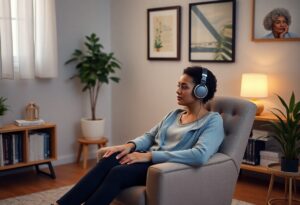TMS, or Transcranial Magnetic Stimulation, is emerging as a promising option for addressing sleep disorders that affect your nightly rest. This non-invasive technique works by targeting specific areas of your brain, potentially enhancing sleep quality and alleviating insomnia symptoms. By exploring brain stimulation techniques as novel treatment options for sleep disorders, you can gain insights on how TMS might fit into your journey towards better sleep. Discover the science behind these innovative methods and their potential to transform your nights.
Key Takeaways:
- Transcranial Magnetic Stimulation (TMS) shows potential in alleviating symptoms of sleep disorders by targeting specific areas of the brain associated with sleep regulation.
- Non-invasive treatment such as TMS may provide a beneficial alternative for individuals who do not respond to traditional sleep medications.
- Research outcomes indicate that brain stimulation techniques could enhance sleep quality and duration, leading to improved overall well-being.
Understanding Sleep Disorders
To grasp the complexities of sleep disorders, it is crucial to examine their various forms and causes. Sleep disorders can significantly impact your overall health and well-being. By gaining insights into these conditions, you can take proactive steps to seek appropriate treatment and improve your sleep quality.
Types of Sleep Disorders
To help you identify common sleep disorders, here’s a breakdown of a few types:
| Disorder Type | Description |
|---|---|
| Insomnia | Difficulty falling or staying asleep |
| Sleep Apnea | Interrupted breathing during sleep |
| Restless Leg Syndrome | Uncontrollable urge to move legs at night |
| Parasomnias | Abnormal behaviors during sleep, like sleepwalking |
| Hypersomnia | Excessive daytime sleepiness |
Thou should be aware that understanding these types can help in identifying which disorder may be affecting you.
Causes and Risk Factors
Below are some of the main causes and risk factors associated with sleep disorders:
- Genetics: Family history of sleep issues
- Lifestyle choices: Poor sleep hygiene, stress, and diet
- Medical conditions: Chronic pain, mental health disorders
- Age: Sleep patterns can change with aging
- Medication: Some medications can disrupt sleep
Perceiving these factors could guide your approach when dealing with sleep disturbances, helping you to make informed choices about managing your sleep health.
Considering the multifaceted nature of sleep disorders, it’s beneficial to explore these factors in greater depth. Here’s a closer look:
- Genetics: Certain sleep disorders may run in families.
- Lifestyle choices: Habits such as excessive screen time or caffeine intake can adversely affect your sleep.
- Medical conditions: Chronic illnesses can lead to sleep disruptions.
- Age: Your sleep requirements and patterns may vary as you age.
- Medication: Consult your healthcare provider if you suspect your medication affects your sleep.
Perceiving these considerations can empower you to take control of your sleep health, leading to improved rest and rejuvenation.

Overview of Transcranial Magnetic Stimulation (TMS)
After exploring various approaches to improving sleep disorders, you may come across Transcranial Magnetic Stimulation (TMS). This innovative technique uses magnetic fields to stimulate nerve cells in the brain, ultimately aiming to enhance functioning and overall well-being.
What is TMS?
Around the world, TMS has gained recognition as a non-invasive treatment method that targets specific areas of the brain. By delivering magnetic pulses through a coil placed on your scalp, TMS can modulate neuronal activity, offering an avenue to alleviate symptoms associated with certain mental health conditions.
Indications for TMS
Behind the scenes, TMS is primarily indicated for conditions such as depression, anxiety disorders, and post-traumatic stress disorder (PTSD). However, its promising potential is increasingly being researched in relation to various sleep disorders, drawing interest for its role in improving sleep quality and mitigating insomnia.
Types of sleep disorders that TMS may be beneficial for include insomnia, sleep apnea, and restless legs syndrome. Additionally, if you experience sleep disruptions due to mood disorders, such as depression or anxiety, TMS might offer relief by addressing the underlying mental health issues impacting your sleep patterns. With ongoing developments in this field, you may find TMS to be a valuable option in your quest for better rest.

TMS and Sleep Disorders
Your sleep quality is fundamental for your overall health, and exploring innovative treatments like Transcranial Magnetic Stimulation (TMS) can open new possibilities. TMS utilizes magnetic fields to stimulate nerve cells in the brain, offering a promising alternative therapy for sleep disorders. A review of repetitive transcranial magnetic stimulation in primary sleep disorders suggests that this non-invasive treatment may effectively enhance sleep patterns and improve your rest.
Mechanisms of TMS in Sleep Regulation
Against the typical reliance on medications, TMS acts by modulating the activity of brain networks involved in sleep regulation. By applying magnetic pulses to specific regions, such as the prefrontal cortex, TMS can promote neuronal excitability and strengthen pathways important for healthy sleep cycles.
Clinical Studies and Findings
Along the lines of recent research, multiple clinical studies indicate that TMS may not only enhance sleep quality but also reduce insomnia symptoms. These studies highlight TMS’s significant potential as a therapeutic option for those grappling with sleep disturbances.
Plus, the findings from various trials suggest that patients who underwent TMS reported improved sleep efficiency, deeper sleep stages, and a reduction in daytime sleepiness. Such studies underline TMS as a viable treatment for sleep disorders, showing promising results in enhancing your overall sleep experience and well-being.
Patient Experience and Safety
Unlike many conventional treatments for sleep disorders, Transcranial Magnetic Stimulation (TMS) emphasizes a non-invasive approach. This means that you can expect a treatment that is usually well-tolerated with minimal discomfort. The process involves using electromagnetic pulses to stimulate specific areas of the brain associated with sleep regulation, delivering a personalized experience aimed at improving your rest.
What to Expect During Treatment
Between sessions, you will sit comfortably in a chair while a device is positioned near your head. The procedure generally lasts about 30 to 40 minutes, during which you may hear a clicking sound as the magnetic pulses are delivered. Most patients find the experience manageable, with the only notable sensation being a mild tapping on your scalp.
Potential Side Effects and Risks
Below the surface benefits, there are potential side effects and risks linked to TMS. While many patients experience minimal adverse effects, it’s necessary to be informed about what could arise during your treatment journey.
Risks associated with TMS include mild to moderate headaches, discomfort at the stimulation site, or transient mood fluctuations. In rare cases, some individuals might experience seizures, particularly if they have a history of epilepsy or are on certain medications. It’s significant to have a thorough discussion with your healthcare provider to evaluate your medical history and mitigate any identified risks before beginning TMS therapy for sleep disorders.
Comparative Analysis
Not all sleep treatments yield the same results or come with the same challenges. In evaluating TMS in relation to traditional sleep therapies, it’s important to look at multiple factors. Below is a comparative analysis to help you understand the differences better.
| Factor | TMS | Traditional Treatments |
|---|---|---|
| Invasiveness | Non-invasive | Can be invasive (e.g., surgery) |
| Side Effects | Minimal | May include sedation and dependence |
| Duration of Treatment | Short sessions (20-40 mins) | May require ongoing therapy for effectiveness |
| Effectiveness | Promising results in studies | Variable outcomes |
| Accessibility | Limited availability in some areas | Widely available |
TMS vs. Traditional Sleep Treatments
Around the world of sleep disorders, TMS stands out due to its innovative approach. Traditional sleep treatments often involve medications or lifestyle changes which can have varying levels of effectiveness and potential side effects. TMS, being non-invasive and focused on brain stimulation, offers a promising alternative that may enhance your sleep without the drawbacks commonly associated with traditional options.
Cost-Effectiveness of TMS
Above all, the cost of treatment can be a determining factor in your choice of sleep therapy. While TMS may have higher initial costs compared to some conventional methods, its long-term benefits and lower side effects can lead to substantial savings over time.
With a focus on long-term impact, TMS may reduce the need for ongoing medications or frequent therapy sessions, which can add to your overall treatment costs. Additionally, investing in TMS may enhance your quality of life by improving sleep quality and reducing associated mental health issues, thus potentially lowering healthcare expenses in the long run. Evaluating these cost factors can be important in deciding if TMS is the right fit for your sleep management plan.
Future Directions in TMS Research
All advances in Transcranial Magnetic Stimulation (TMS) research are shifting the paradigm in sleep disorders treatment, providing hope for millions seeking restful nights. Recent studies, such as one showcasing the Efficacy of non-invasive brain stimulation for post-stroke …, highlight significant strides in understanding how TMS can impact sleep patterns. As researchers continue to explore this, you can look forward to a more refined approach to addressing sleep disorders through brain stimulation.
Innovations in TMS Technology
At the forefront of TMS research, innovative technologies are revolutionizing how you might experience sleep enhancement therapies. Enhanced targeting methods are being developed to deliver stimulation with greater precision, potentially increasing the overall effectiveness of treatments. The integration of real-time EEG monitoring during TMS sessions holds promise for personalizing therapy, making it more adaptive to your individual brain activity patterns.
Long-Term Studies and Implications
Technology in TMS research is advancing towards longer-term studies that measure the sustained effects of stimulation on sleep quality and disorders. This shift underscores the importance of understanding not only immediate outcomes but also how these effects endure over time. You might appreciate that as researchers gather more data, the potential for establishing guidelines on the duration and frequency of TMS treatments will grow, providing clearer pathways for clinicians.
Considering the importance of long-term insights, ongoing studies promise to elucidate how TMS can offer consistent benefits to sleep, impacting your overall health and well-being. The establishment of robust evidence will not only enhance the credibility of TMS as a treatment modality but will also empower you with informed choices regarding your sleep health. As research progresses, it will be crucial to follow these developments to navigate your treatment options effectively.
To wrap up
From above, it is clear that Transcranial Magnetic Stimulation (TMS) offers a promising avenue for addressing sleep disorders. By utilizing targeted brain stimulation, you may experience improvements in your sleep quality and overall well-being. While TMS is not a standalone treatment, integrating it into your sleep management plan could enhance your ability to achieve restful nights. As research continues to evolve, staying informed about your options empowers you to take proactive steps toward better sleep health.
FAQ
Q: What is TMS and how does it relate to sleep disorders?
A: Transcranial Magnetic Stimulation (TMS) is a non-invasive procedure that uses magnetic fields to stimulate nerve cells in the brain. It is often employed to treat various mental health issues, such as depression, and has been explored for its potential benefits in addressing sleep disorders. TMS aims to modulate brain activity, which can have a positive impact on sleep regulation and overall sleep quality.
Q: What types of sleep disorders can TMS potentially help with?
A: TMS has shown promise in alleviating symptoms of several sleep disorders, including insomnia, sleep apnea, and restless leg syndrome. By targeting specific areas of the brain associated with sleep-wake cycles, TMS may help improve the ability to initiate and maintain sleep, leading to overall better sleep quality.
Q: How effective is TMS for treating sleep-related issues?
A: The effectiveness of TMS for sleep disorders can vary from individual to individual. Early research indicates that TMS can lead to significant improvements in sleep quality and wakefulness, particularly for those who have not responded to traditional treatments. Ongoing studies are needed to establish the long-term efficacy and optimal treatment protocols for TMS in the context of sleep disorders.
Q: What should a patient expect during a TMS session aimed at improving sleep?
A: During a typical TMS session, patients sit in a comfortable chair while a specialized device delivers magnetic pulses to targeted areas of the brain. The procedure is usually painless and lasts around 20-40 minutes. Patients may experience mild discomfort or a tapping sensation on their scalp but can return to their regular activities immediately afterward. A treatment plan typically involves several sessions over a few weeks.
Q: Are there any risks or side effects associated with TMS for sleep disorders?
A: TMS is generally considered safe, with few side effects. The most common side effects include mild headache, scalp discomfort, and transient changes in mood or sleep patterns. Serious risks, such as seizures, are extremely rare. As with any treatment, patients should discuss their specific health conditions with their healthcare provider to determine if TMS is an appropriate option for them.







